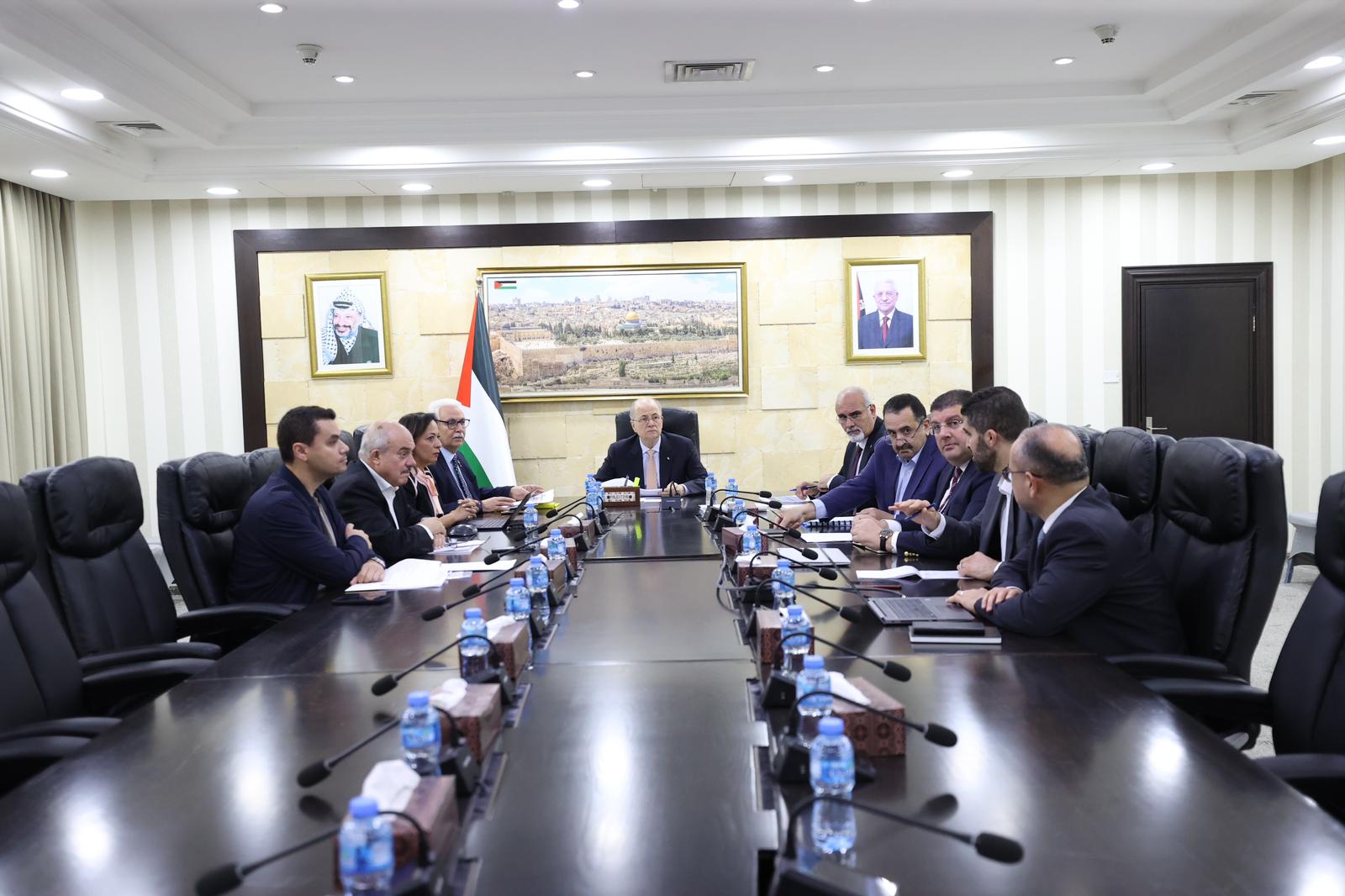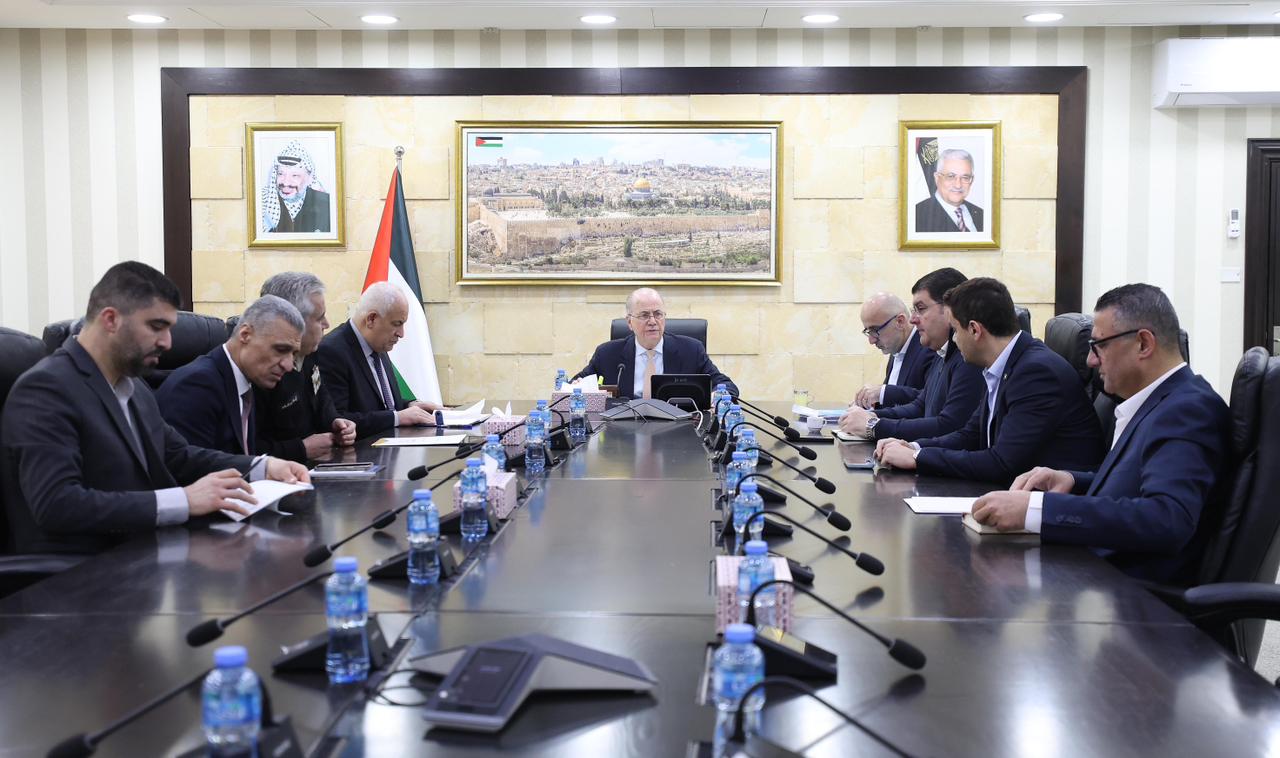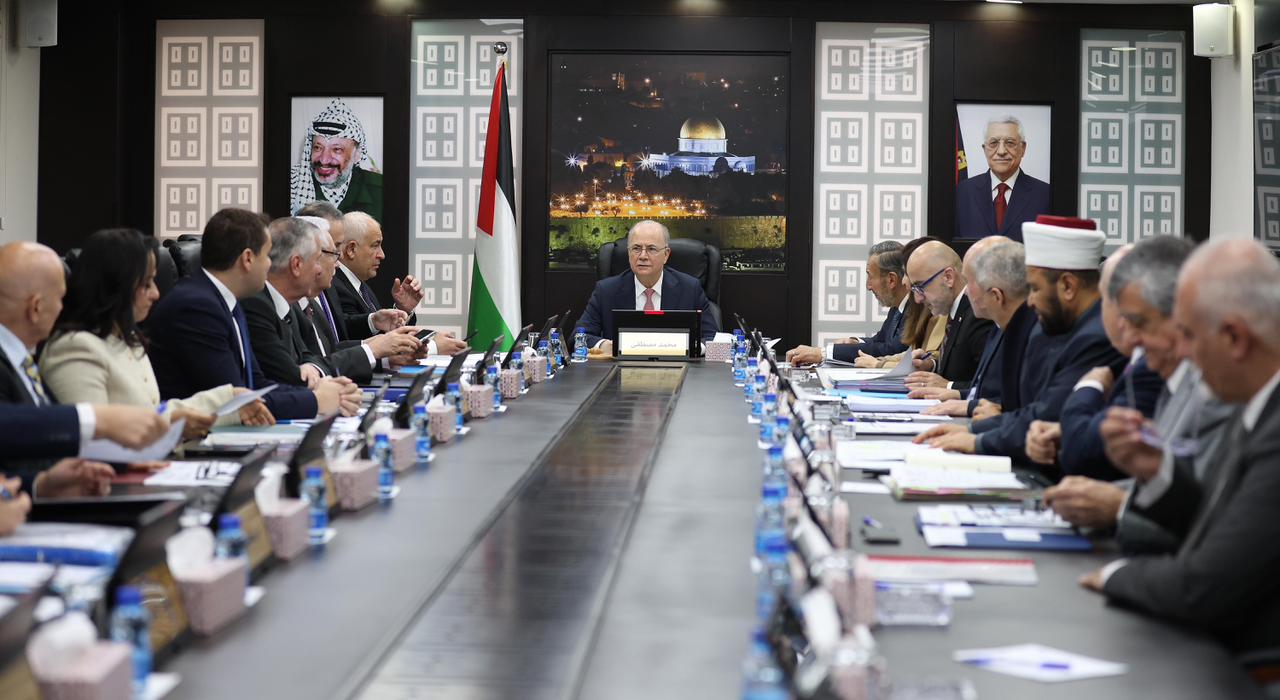RAMALLAH, October 28, 2024 (WAFA) – Recognizing the challenges of the current phase and in alignment with the Government’s mandate as set forth by H.E. President Mahmoud Abbas, Prime Minister Dr. Mohammad Mustafa, during the opening session of the Cabinet meeting on Tuesday, October 22, 2024, outlined the draft of the first phase of the National Program for Development and Reform.
The program, developed through consultation with relevant stakeholders, including civil society and the private sector, is a core component of the President's assignment to the Government to implement a series of development, reform, and improvement initiatives aimed at enhancing public institutions, upholding the rule of law, fostering good governance, and achieving comprehensive economic development.
The program is designed to revitalize the Palestinian national economy and support its recovery from the severe economic shock caused by the Israeli aggression on Gaza and the West Bank. It also seeks to address the deep-rooted structural imbalances that have worsened over the past decades. By fostering greater self-reliance, promoting economic growth, and reducing both poverty and unemployment rates, the program ultimately aims to pave the way for comprehensive socio-economic and environmental development, targeting key areas where tangible positive change can be achieved.
The Government has intensified its efforts to create favorable conditions for improving the performance of government institutions and enhancing service delivery to the Palestinian people in order to enable them to survive and thrive in their homeland. To this end, the draft of the first phase of the "National Program for Development and Reform" has been prepared, outlining a two-year implementation plan. This draft provides a strategic framework that identifies the Government’s key priorities and urgent areas of intervention in the upcoming period, all of which are of paramount national significance.
The National Program for Development and Reform is structured around two main parts. The first comprises seven strategic cross-sectoral development initiatives designed to stimulate economic revival and transformation. The second emphasizes four key pillars aimed at enhancing institutional performance through a series of targeted development and reform measures.
Part 1: Strategic Cross-Sectoral Development Initiatives
This part consists of seven primary initiatives:
- Renewable Energy Initiative: This initiative is focused on advancing Palestine's transition to a green economy by expanding the role of renewable energy in meeting national electricity demands, boosting the energy sector’s contribution to GDP, creating green jobs, and reducing reliance on imported energy. The initiative includes various projects, such as public-private partnerships, renewable energy for households, self-consumption renewable energy, solar energy for refugee camps, and a renewable energy program for the public sector.
- Localizing Health Services Initiative: This initiative aims to catalyze private and non-governmental investment in the healthcare sector, enhance the public healthcare system, and reinforce healthcare infrastructure and capabilities. It also seeks to improve access to health services while reducing the cost of medical referrals outside the public health system. Projects under this initiative include a national strategy to control and reduce cancer, reducing chronic diseases like heart disease, providing a safe environment for premature infants, digitizing healthcare services, and preparing for the establishment of Palestine’s first national cancer center.
- Digital Payments for a Digital Economy Initiative: This initiative marks a significant step toward comprehensive digital transformation by advancing the digital financial services sector and supporting the development of a robust digital economy. It also aims to promote innovation, enhance transparency in government revenue management, ensure tax fairness, and reduce cash dependency in commercial transactions. The initiative includes a central revenue system, a digital VAT and customs platform, a national digital payment platform, and the establishment of a fintech incubator and accelerator center, along with a digital awareness and training program.
- Social Protection Inclusivity Initiative: This initiative aims to promote and achieve social justice and inclusion, addressing the severe and unprecedented social impacts caused by the devastating war on Gaza and the brutal aggression on the West Bank. Its primary objective is to support vulnerable families by creating economic opportunities and dignified livelihoods, improving living standards, and fostering social stability. Key projects include a life-saving project, a protection project, a future leaders’ project for orphans, and a recovery program for injured children.
- Sustainable Local Governments Initiative: This initiative aims to achieve fiscal sustainability for local governments, enhance their creditworthiness, reduce operational expenses, increase revenue streams, and enhance their capacity to provide essential services to citizens. Key projects within this initiative include generating electricity from renewable sources, developing sustainable wastewater treatment models and developing reuse systems for agricultural purposes, \ and digitizing local governments services.
- Food Security Initiative: This initiative is aimed at improving the productivity of field and agricultural crops, enhancing irrigation projects, supporting farmers and rural communities, and reducing dependence on imported agricultural products. It focuses on increasing local production of strategic agricultural commodities, developing sustainable irrigation systems, restoring agricultural ecosystems, combating desertification, and ensuring the sustainability and resilience of agricultural activities through urgent response mechanisms.
- Education for Development Initiative: This initiative aims to drive a comprehensive transformation in education by improving learning outcomes and enhancing the quality of the educational process. It emphasizes expanding access to various levels of education, equipping teachers with advanced teaching skills, and strengthening the resilience of the educational system. Key focus areas include enhancing the quality of preschool education, vocational training, and general school education; enhancing school curricula and learning materials to serve Palestinian market needs and national priorities; and implementing a new evaluation system for general secondary education. This system moves away from traditional assessment methods based on memorization and indoctrination, adopting a comprehensive approach that recognizes diverse student competencies and practical skills.
Part 2: Legislative Environment Development and Institutional Performance Improvement
This part is grounded in four key pillars:
- Fiscal Policy Development and Public Financial Management: This aims to enhance domestic revenue generation through improved tax management, the adoption of a new VAT law, and the revision of the income tax law. Additionally, it seeks to rationalize public spending through conducting a functional review of ministries and public institutions, enhancing the oversight system for government spending, implementing measures to control salary expenditure, adopting a plan to repay the government’s arrears, along with an action plan for pension system reform, and developing the Ministry of Health’s medical referral system. It also seeks to achieve financial sustainability by setting a maximum budget deficit limit and restructuring public debt.
- Governance and Rule of Law Enhancement: This includes strengthening the legal and institutional framework, improving the efficiency of the judicial system, and digitizing judicial procedures. It also focuses on promoting democracy and freedom of expression consolidation and reviewing the cybercrime law to keep pace with technological developments and align with international standards.
- Legislative and Regulatory Environment for Investment and Business Development: This focuses on digitizing business services including company registration, and creating a one-stop shop for businesses, as well as an electronic information portal to provide guidance on the procedures and requirements necessary to start or operate commercial activities. This also includes improving the legal and legislative environment, which involves updating the Investment Promotion Law, enacting a Public-Private Partnership Law, adopting a Competition and Antitrust Law to foster a competitive free market environment. Additionally, it involves reviewing the Companies Law in line with best practices to address challenges that have arisen from its implementation.
- Basic Service Delivery Improvement: This includes improving services in key sectors, primarily:
- Enhancing Water Sector Services: This involves adopting a national emergency response plan to address water crises in the Gaza Strip, updating the national policy and strategy for water and wastewater, and ensuring sustainability in water supply services. Additionally, it aims to adopt new tariffs for water and wastewater services across all governorates, and regulate the collection of water sales, prioritizing payments for water sourced from various providers.
- Enhancing Energy Sector Services: This includes adopting a national energy strategy for the period (2025-2030), improving the legal and regulatory framework to encourage and attract investment in renewable energy sources. It also includes adopting appropriate tariffs for producers generating electricity from renewable sources, establishing a new system for renewable energy producers for self-consumption, and incorporating an electricity storage program in renewable energy projects. Additionally, it aims to achieve sustainability in electricity supply services, allowing all electricity consumers and distributors to invest in renewable energy sources to meet their electricity needs, adopting a national tariff for electricity sales to consumers that encompasses all cost elements, and regulating the collection of electricity sales, with an emphasis on prioritizing payments for electricity sourced from various providers.
- Enhancing Health Sector Services: This involves restructuring the health service purchasing system, ending exemptions within the referral system for services outside the government medical network, and reviewing the health insurance system to improve service quality. It also involves developing an electronic medical referral system for efficient processing and tracking of medical referrals and conducting technical and financial audits on all claims related to medical referrals to expedite their processing.
- Enhancing Telecommunications Sector Services: This includes expediting the implementation of the electronic high-priority services project for citizens, adopting a national digital identity roadmap, adopting the data protection law to facilitate secure electronic transactions, expanding the use of electronic payment systems across all economic activities, and endorsing a mechanism for instant digital collection of value-added tax.
- Enhancing Education Sector Services: This involves increasing enrollment rates in pre-school education, improving the quality of public education to meet international standards, and aligning it with labor market demands. It also focuses on building teachers' capacities, enhancing their skills, and adapting the educational process to meet the national needs and address global challenges.
- Enhancing Social Protection Sector Services: This includes building a comprehensive needs-based social protection system, relying on collecting comprehensive data on social cases through field visits, and digitizing social protection service delivery.
Despite the difficult conditions and unprecedented humanitarian and economic crises, the Government of Palestine is intensifying its efforts to improve the performance of public institutions and enhance service delivery through the National Program for Development and Reform, which will play a significant role in achieving the aspirations of our people for dignity, freedom, prosperity, and the establishment of the independent Palestinian state with Jerusalem as its capital.
M.N













